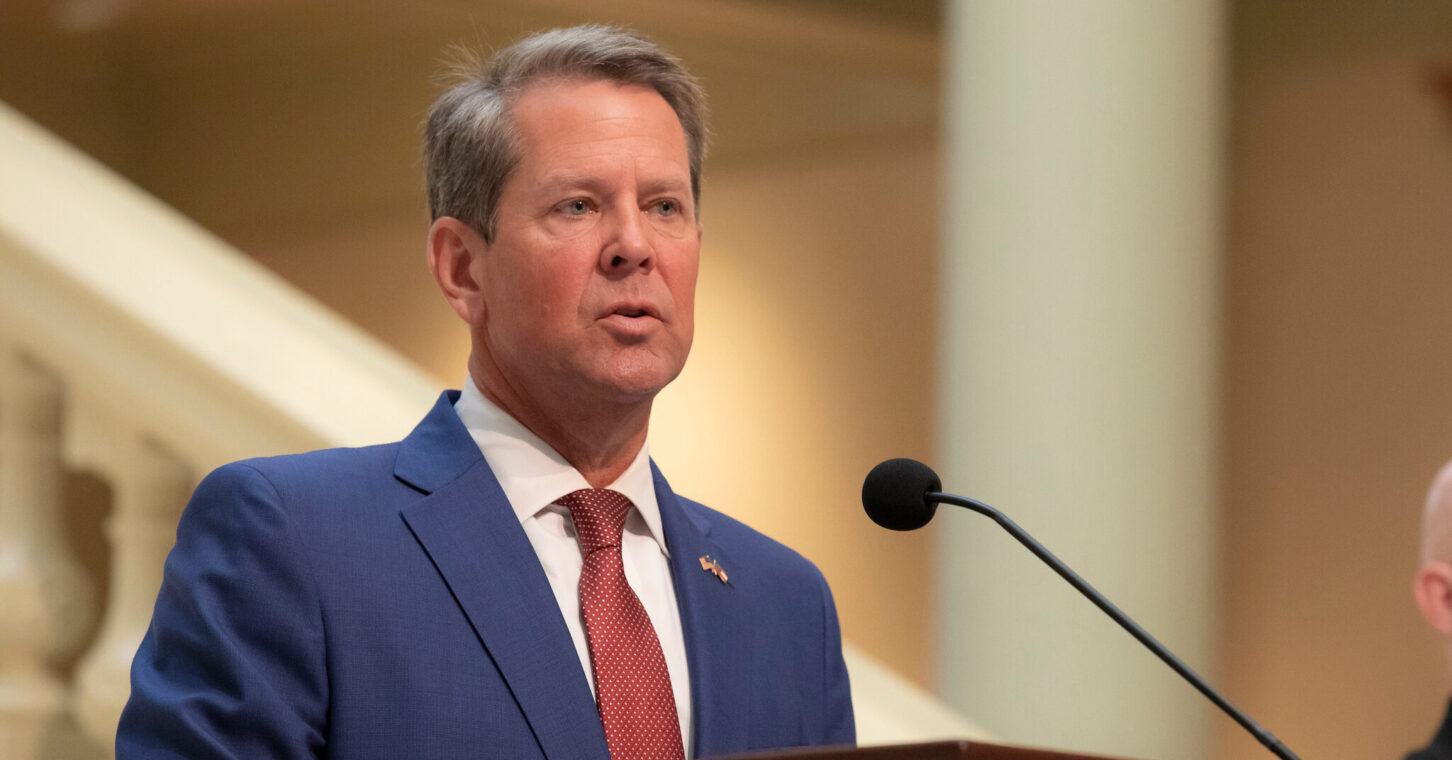
Gov. Brian Kemp gave his annual State of the State Address before the Georgia General Assembly on Thursday. His message was a positive one; he described Georgia as a growing and prosperous state with a fiscally conservative government.
The legislature on Friday will conclude the first week of this year’s legislative session, as it begins to tackle policy, budget and social issues facing the Peach State.
Kemp began his address by drawing a contrast between Georgia and the federal government, saying, “[Voters] will see what we’ve achieved together on the state level to make Georgia an even greater place to live, work, and raise a family, and they’ll see the hardships Washington, D.C., has brought into every home and placed on every kitchen table across our state.”
Kemp pointed out Washington’s association with out-of-control spending, job-killing regulations, high prices, high mortgage rates and other hardships that fall on common Americans, while touting Georgia’s record of sound fiscal management. He cited his administration’s recently announced plan to speed up cutting the state income tax as well as direct tax refunds, gas tax suspensions and homestead tax exemptions.
Despite the optimism the governor warned against coasting on success and pointed out that there is work to be done on several fronts. One of the most important of those is education.
Kemp mentioned the success of Georgia MATCH, “the largest direct college admissions program in the nation” unveiled last year. He also expressed commitment to increase K-12 funding and investing in students’ safety. He also reaffirmed his support for school choice policies, echoing many of the sentiments we have espoused here at the Georgia Public Policy Foundation.
Kemp referenced one of the most important and contentious pieces of legislation that was held over from last year’s session: a bill that would provide Promise Scholarship Accounts of $6,500 per school year to students in failing school districts. This bill passed the Senate last year, but despite support from Kemp’s office, it did not pass the House. It was sent back to the House Education Committee, where it awaits action.
It is encouraging, however, to hear that support continue and to hear the urgency with which Kemp presented the issue. He explained,
“Some prefer the term school choice or educational freedom, some call them vouchers.
In my opinion, what each of those terms or slogans fail to mention is the child. At the end of the day, our first and foremost consideration should be the future of that student.
“Our job is not to decide for each family, but to support them in making the best choice for their child. This week, as we begin the second year of another biennial of the General Assembly, I believe we have run out of ‘next years.’
“I firmly believe we can take an all-of-the-above approach to education… whether it’s public, private, homeschooling, charter, or otherwise.”
While school choice fell a few votes short in Georgia last year, neighboring states of Florida, North Carolina and South Carolina all passed similar programs.
Kemp also addressed healthcare, specifically his administration’s effort to expand access and reduce costs. Notably, however, he did not mention the effort to repeal Georgia’s Certificate of Need (CON) laws, another contentious issue that was held over from last year’s session. CON repeal has been at the forefront of state healthcare debates, including as an attachment to Medicaid expansion.
Another of the governor’s points of emphasis was public safety. He emphasized the need for completing the Atlanta Public Safety Training Center, and further spoke out in support of Georgia’s law enforcement. He also touted the success of the GBI’s efforts in combating gangs and human trafficking.
The governor’s address was extensive but not exhaustive. As mentioned, the healthcare debate covers an enormous landscape of policies and administrative practices. Occupational licensing also figures to be an important policy area this year, as evidenced by Lt. Gov. Burt Jones’ “Red Tape Rollback,” a legislative priority announced last year.
The new legislative session and 2024 being an election year is sure to bring about new political fights and continuations of old ones. The Kemp administration has the luxury of a budget surplus and a fiscal track record that might lead to an optimistic outlook.
Last year, some advocates asserted that the administration’s support for school choice was not enthusiastic enough, or that it came too late in the legislative process. Given this, it is encouraging that Kemp used his platform to offer support for promise scholarship legislation.
Notably absent was any mention of tort reform. On Wednesday, the governor announced at the Georgia Chamber of Commerce’s annual legislative preview that he would be undertaking a multiyear track to reduce legal costs and bring down insurance premiums, rather than pursuing legislation in the 2024 session.
As proverbial happy warriors, we can partly echo a positive outlook for a state that continues to thrive in spite of federal malaise. However, we should also amplify Kemp’s warning that we are out of “next years” on a number of policy fronts that impact each Georgia citizen.